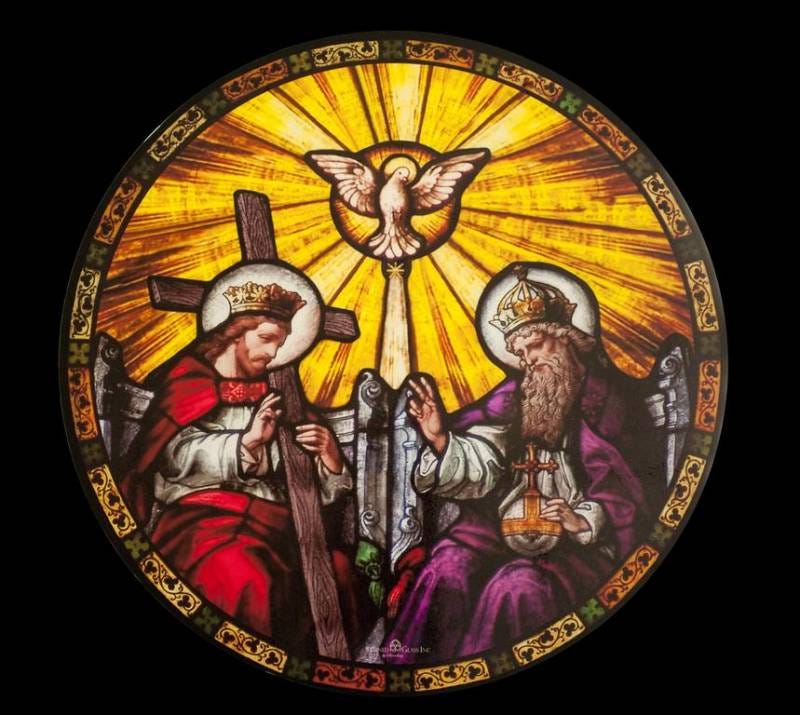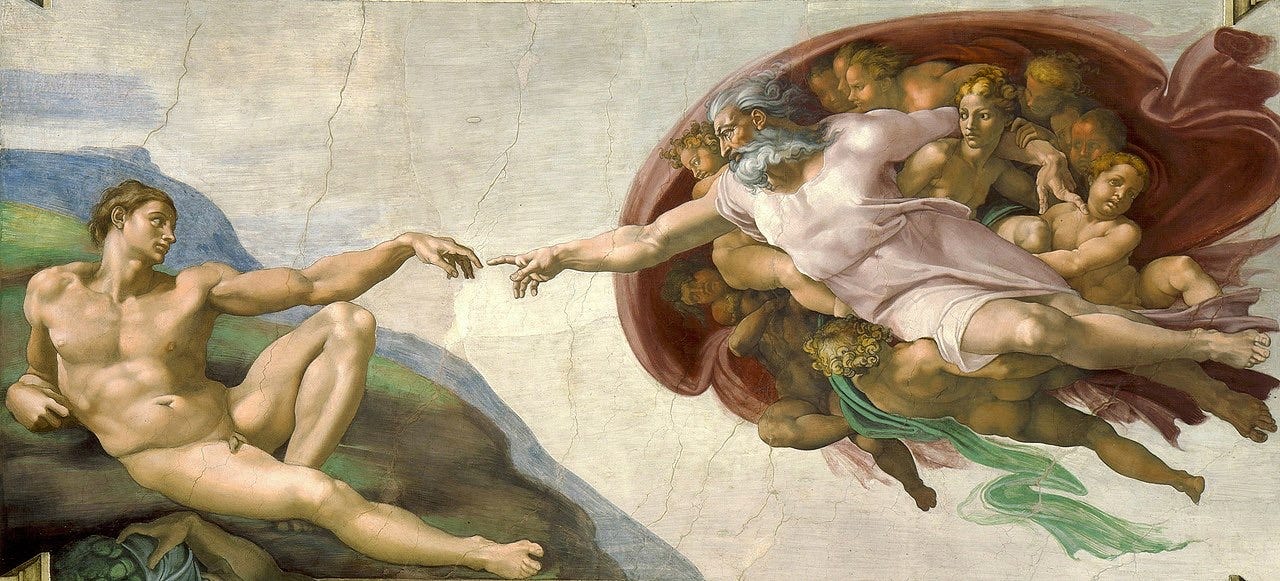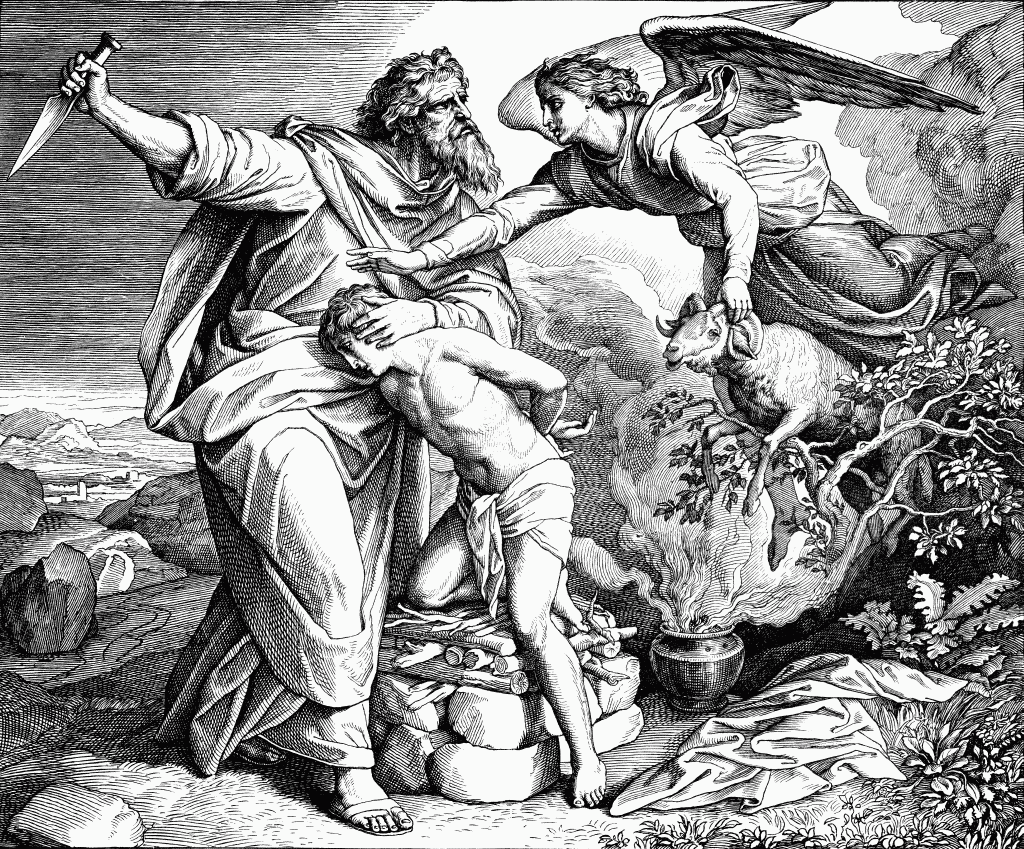The nature of God as a triune being—Father, Son, and Holy Spirit—offers a profound narrative of divine love, justice, and redemption. It also presents a conundrum to many; how can God be three-in-one?
In this essay, I will lay out my interpretation of the Holy Trinity, the intricate relationship within the Holy Trinity and its implications for human free will, redemption, and the path to eternal life with God. God’s triune nature is a divine mystery which I believe we are simply unable to truly comprehend, and most analogies end up falling into various heresies (modalism, Arianism, Nestorianism, and so on), but I have attempted an explanation here and have endeavoured to avoid such heresies and adhere strictly to the Nicene Creed. I am entirely open to criticism and correction by those more theologically informed than myself.
The Nature of the Trinity
The Father, eternal and perfect, perceives Himself through His self-image, the Imago Dei, embodied in the Son. This is similar to how we each have an image of ourselves, a conception of ourselves, in our heads. This reflection, loosely akin to viewing oneself in a mirror, forms the basis of the Son’s existence. The Father, in eternally begetting the Son, reveals Himself fully and perfectly in another person who shares His divine essence, maintaining a distinct yet unified relationship.
The Father and the Son are distinct, but both exist within the same divine essence. As the Father, Son, and Holy Spirit share the same divine essence, the three of them share a unified will, but their eternal, loving relationship is possible because of their distinct personhood and subjectivity.
The Father is God, and the Son is also God, but the Father and the Son are not the same. The Father and the Son, both partaking of the divine essence, have looked upon each other and witnessed each other’s perfection, and thus have eternally existed in a constant state of undying love for one another. This selfless, incomprehensible love is the Holy Spirit.
Thus, the Son is ‘eternally begotten of the Father’—the Son was not made; He has always existed. As the Father and the Son have eternally loved one another, the Holy Spirit therefore eternally ‘proceeds from the Father and the Son’. Thus, even before the creation, God—Father, Son, and Holy Spirit—is, and always has been, love, by His very nature.
The Flaws of Creation
Humanity was created in the image of God but does not partake in the divine essence due to its separation from God. All of creation is fundamentally flawed, manifested most prominently in its contingency—it was not always, and need not always be. That which is created is inherently limited—it exists within time and within space, that is to say, within certain parameters unlike God who is unconstrained by the limitations of the physical world He created.
Our separation from God means we are, naturally, imperfect. Our will is not God’s will. Only God’s will is perfect—thus our will is imperfect, since it is not in accordance with God’s will. For us to be reunited with God, our will must align with God’s will; we must surrender our will to the will of God. Humanity, created in the image of God, does not naturally partake in the divine essence due to sin and finitude, but is invited into divine communion through Christ.
As humans are unfathomably separate from God, there is nothing we could do to reunite ourselves with Him. Humanity, created in the image of God but intrinsically separate and imperfect, is invited back into divine communion through the sacrificial act of Jesus Christ. “For us and for our salvation, [the Son] came down from heaven, was incarnate from the Holy Spirit and the Virgin Mary, and was made man.”
The Bridge of Sacrifice
Jesus Christ, the incarnation of the Son, was both truly man and truly God; He possessed both a human nature and a divine nature, separate but contained within the same person. As the Chalcedon Definition of 451 AD puts it, Christ is “made known in two natures united unconfusedly, unchangeably, indivisibly, inseparably. The distinction between the natures is not at all destroyed because of the union, but rather the property of each nature is preserved and concurs together into one person and subsistence. He is not separated or divided into two persons…”
Christ, in His sacrifice for all upon the cross, ‘bridged the gap’, so to speak, between flawed humanity and perfect divinity. The human nature and divine nature, combined into one perfect incarnation, was required to bring together creation and God.
The Consequences of Free Will
As God respects and loves His creation, He respects and loves the free will which He has given us. True respect and love include allowing the object of your respect and love to make their own decisions, even if those decisions are detrimental to themselves.
God could snap His fingers and make all of humanity love Him, but that would negate our free will. God could make us all behave in an absolutely moral manner, but such actions would then be literally meaningless. As Augustine and Aquinas have famously articulated, God permits evil to allow for genuine free will and the possibility of authentic love and moral choices, highlighting His respect for human dignity and freedom. This solves the so-called ‘paradox of evil’; our actions can only be truly moral (or immoral) if freely chosen. The evil in the world is, therefore, a consequence of humanity’s misuse of the free will bestowed upon it.
The Right Hand of God
In Michelangelo’s masterpiece ‘The Creation of Adam’, we see God and Adam reaching towards one another. God, however, is stretching forwards far more than Adam. He is leaning as far as He can go, with His arm fully outstretched, while Adam lounges back, hand and finger half-heartedly offered.
God extends His hand to us, but He does not force our hand; we are free to accept or deny His grace, but the consequence of denial is, naturally, eternal separation from God after death. The consequence of accepting God’s invitation to partake in His unending dance of love is eternal love after death.
Christ is often referred to in the Bible as either sitting at, or being, God’s ‘right hand’ (see Mark 16:19; Acts 2:33; Matthew 26:64). Thus, we can see that God’s ultimate offering of His hand to us was in sending the Son Himself down to live in human form and be killed as a sacrifice, to clear the obstacle of sin from our path, as well as fulfilling the many laws and rituals that pointed towards Him in the Covenant of the Old Testament. All that is required now, following Christ’s triumph over death, is faith in His sacrifice and repentance of sin (1 John 1:7-9; Ephesians 2:8-9).
The Sacrificial Lamb
In the book of Genesis, a story is told of Abraham, in which he is commanded by God to “Take now your son, your only son Isaac, whom you love, and go to the land of Moriah, and offer him there as a burnt offering on one of the mountains,” (Genesis 22:2). Recall, of course, that Abraham and Sarah had been blessed by God, despite their advanced age, with their son and were deeply devoted to him. Such a command would be heart-wrenching for anybody, but especially so for Abraham.
In Genesis 22:8, as Abraham and Isaac are making their way up Mount Moriah, Abraham tells Isaac that “God himself will provide the lamb for the burnt offering, my son.”—foreshadowing Christ’s eventual sacrifice. As Abraham was readying himself to kill Isaac atop Mount Moriah, the voice of an angel of the Lord called to him; ‘And He said, “Do not lay your hand on the lad, or do anything to him; for now I know that you fear God, since you have not withheld your son, your only son, from Me.”’ (Genesis 22:12).
Conversely, Christ’s sacrifice on the cross allows us to say to God, “Now I know that you love me, since you have not withheld your Son, your only Son, from me.” To sacrifice not only something dear to oneself, but the thing—or person—one cherishes most in the world shows a staggering level of commitment towards the one for whom the sacrifice is given. Abraham was willing to sacrifice his only son to God to prove his commitment; God sacrificed His Son to prove and reaffirm His commitment and undying love for us, to renew His covenant with flawed humanity.
God is a God of love, but also a God of justice. Therefore, it is fair for those who freely reject God’s love and grace to face eternal separation, as they choose this themselves. God wants more than anything for every individual to join Him in the afterlife, but He respects our free will and autonomy too much to force our action. It would not be just otherwise. After all, if we did not possess free will, we would be nothing more than animals running on instinct, or robots programmed to act as commanded. True faith and true adherence to God’s will can only be willingly offered.
The bridge to reconciliation with God is built on the sacrificial offering of His only Son, Jesus Christ; the body and blood. In surrendering to His will, we find not only forgiveness and redemption but also the promise of eternal communion with the source of all love and light. We can go confidently in faith, guided by God’s grace and the enduring truth that through Christ's loving sacrifice, the impossible has been achieved; the bridge between flawed humanity and perfect divinity has already been secured.
His hand is outstretched; we need only accept it.








